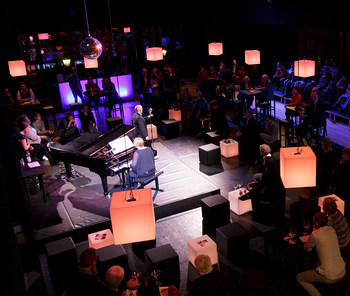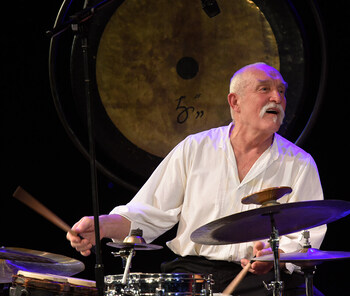»The new Junges Ensemble introduces itself«
»Songs of a fairytale princess«
»Sehnsucht/ Yearning«
»Nikolaus Habjan«
»Und morgen wird die Sonne wieder scheinen«
»Carols for the Advent season«
»40th birthday celebrations«
Dates
Sub / Packages
The piece is also part of
Sub / Packages
The piece is also part of
Sub / Packages
The piece is also part of
Piece-Info
»The new Junges Ensemble introduces itself« – this somewhat prosaic title actually describes an array of highly talented young artists who are being prepared for brilliant careers via a two-year course of education and training programme at the Semperoper. The 2023/24 season will once again see the launch of a new international Junges Ensemble in Dresden. Accompanied by the programme director, Leonard Martynek, this is a unique opportunity to experience and meet these »newcomers« at close quarters in their own artistic programme.
At the heart of this evening recital is the cycle »Six Songs of the Fairytale Princess« by Karol Szymanowski: The princess lives in a palace in a large garden. Her lover is gone and a feast is taking place ... that’s all this mysterious woman reveals about herself. As in Szymanowski’s most famous opera »Król Roger« (King Roger), the world portrayed in these songs is mysterious and entirely poetic. The voice of the princess itself becomes a thing of enchantment, casting a spell over the audience and transporting it into another realm. This cycle is joined by a wide variety of other songs from around 1900, presenting the multifaceted musical life of Poland at that time, such as the small but expressive song oeuvre of Mieczysław Karłowicz with his late Romantic compositions. However, the most diverse compositional styles have one thing in common: a thematic preoccupation with fairy tales, into whose fantastic, symbolistic and ambiguous worlds they invite us.
In the words of E.T.A. Hoffmann, the »eternal yearning« for things unattainable such as love, the moon, home, redemption or even death form the emotional core of German Romanticism. Joseph von Eichendorff gave expression to this feeling in his poem »Sehnsucht« of 1834 – but it can also be found in Franz Schubert’s »Winterreise« or in Richard Wagner’s motif of yearning in »Tristan und Isolde«. Dedicated to this feeling, this matinee song recital embarks on a journey that begins with Robert Schumann’s »Mondnacht«, based on a poem by Josef von Eichendorff, before taking us to various places and people, including »Pirate Jenny« by Kurt Weill and Bertolt Brecht.
Whistling in the theatre? – that’s a really touchy subject! Probably it heads the list of no-goes in theatreland. And ignoring this rule could have had particularly dramatic consequences until the end of the 19th century, when auditoriums were still lit with gas lamps. A piercing whistle would be emitted if the oxygen levels in the lamps got too low: this could either mean that hardly any fuel was left in the lamp or that gas was flowing somewhere out of an open pipe – a situation that could quickly have deadly consequences. Anyone who decided to whistle for fun could cause a false alarm, thereby massively disrupting rehearsals and performances.
However, whistling is sometimes permitted during performances, such as Arrigo Boito’s whistling devil in Mefistofele. And concert whistlers were highly popular in the 19th century: audiences loved to hear operetta arias, concert waltzes and other musical gems whistled by famous performers. But this special skill soon fell into oblivion … until, that is, Nikolaus Habjan revived the lost tradition of concert whistling. A truly universal theatrical artist, Habjan is a stage director, puppet designer and virtuoso puppeteer. His most recent production at the Semperoper was Claudio Monteverdi’s L’Orfeo. And he is also one of the world’s best concert whistlers. In 2018, he was the first whistler to perform in Hamburg’s Elbphilharmonie concert hall. His speciality is coloratura arias from three centuries of opera, with a repertoire ranging from Handel and Mozart to bel canto; he is also an elegant performer of Verdi, Schubert, Wagner and Strauss. Habjan is accompanied at the piano by Ines Schüttengruber.
At the matinée concert „Und morgen wird die Sonne wieder scheinen“, we take a musical look at the love lives and relationships of unusual women and men. It goes without saying that Richard Strauss and his wife Pauline de Ahna – musically immortalised in the opera „Intermezzo“ – will feature on the programme.
In the run up to Christmas, the Semperoper ensemble and children’s choir will get us all in the festive mood with a programme of beautiful carols featuring old favourites and new discoveries.
A milestone birthday is a reason to celebrate, and so in 2025 we are commemorating the 40th anniversary of the reopening of the Semperoper with various events, including a matinée concert at which you can enjoy well-known and less familiar pieces from the musical history of Dresden’s opera house.



